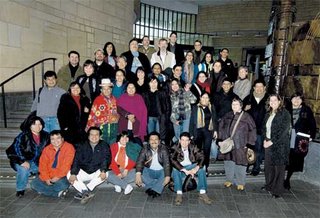Distinguished Chairman of the Permanent Council, we the representatives of Indigenous Peoples want to express our position in regards to the last session of negotiations of the working group responsible for drafting the American Declaration on the Rights of Indigenous Peoples.
We regret that some States insist to hinder negotiations which have been held for more than 17 years, by introducing at the last minute, new text to make the provisions in the American Declaration ambiguous, below the standards of the Declaration of the United Nations and not recognize the rights of Indigenous Peoples, which is contrary to international human rights law.
The Caucus considers this a vile disrespect and bad faith and will not accept any disposition that limits the human rights of Indigenous Peoples to the constitutions, domestic laws and public interest and allow the continued violation of indigenous rights and destroy all progress we have achieved in the American Declaration.
The Indigenous Caucus denounces before the Committee on Juridical and Political Affairs, the Permanent Council and the General Assembly that the conditions for the adoption of an American Declaration on the Rights of Indigenous Peoples of the Americas do not exist, because there is no respect for the principles of the negotiation process that led Indigenous Peoples to the negotiation of an American Declaration without weakening it and without taking it below the standards of the UN Declaration on the Rights of Indigenous Peoples.
We ask the Committee on Legal Affairs, the Permanent Council and the General Assembly of the Organization of American States (OAS), to take the necessary measures to enable the full and effective participation of Indigenous Peoples in the discussion and adoption of the American Declaration in an environment of respect and equality.
We the Indigenous Peoples will not accept any language that is contrary to the UN Declaration. We Indigenous Peoples reject and denounce the text of the American Declaration submitted for discussion and consider it illegitimate.
Having said that and in view of the fact that there are no conditions for negotiations at this eighteenth session, we the indigenous peoples remove ourselves from the negotiating table and will not recognize any text.
Washington D.C. 15th May, 2015.
Contact: Anita Tzec anitatzec@yahoo.com


















